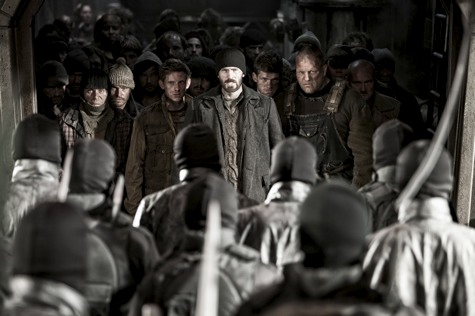Going into Snowpiercer, the most important thing to remember is this: at its core, it is a horror film, though its sci-fi packaging would suggest otherwise. Remember how Danny Boyle’s Sunshine sucker-punched you the same way? Well, this stars Chris Evans, too. He seems to have an affinity for these sorts of films when he’s not wearing spangly outfits.
The reason why it is important to remember this is because Snowpiercer is not going to leave you with a warm cuddly feeling by the time the credits role. There are no happy morals to latch onto, no message waiting to enfold you by the end and assure you that everything is all right. This movie is not here to coddle you or indulge your feelings. This movie is about the ugliest shades of humanity, and every step the film takes is intended to gut you.
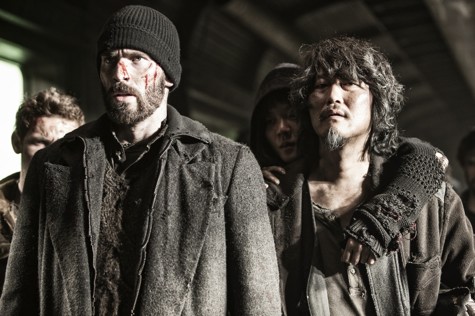
Which is not to say that it isn’t a superb piece of storytelling and well worth the trip to the theater. It’s based off a 1982 French graphic novel, and if you’ve ever seen French dystopia at work (such as Delicatessen, for example), then you’ll have a better idea of where this story is heralding from. The premise revolves around a relatively simple conceit; when global warming threatens to wipe us out, we release some sort of chemical into the atmosphere that causes another ice age. The only survivors are aboard a train called the Snowpiercer. It never slows or stops, and is completely stratified by class. The people living in “the tail” were never ticketed passengers, and their living conditions are easily comparable to interment camps.
Others have attempted revolt, but were never successful. So the current leader of the insurgents, Curtis (Evans), is planning to take the engine of the train. He’s backed by Gilliam (John Hurt) who is ever the perfect statesman, full of useful wisdoms. Along for the ride are several denizens of “the tail” including Edgar (Jamie Bell) and Tanya (Octavia Spencer), and two addicts from the prison car, Namgoong Minsoo (Kang-ho Song) and Yona (Ah-sung Ko). Evans thoroughly disappears into the role of Curtis, edging far from the upright morality of Captain America. Everyone in the cast is superb and forms a flawless ensemble.
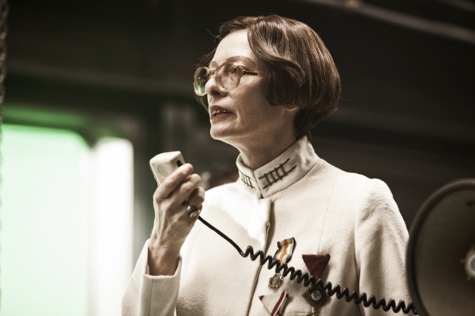
Tilda Swinton nearly steals the film (as always) in her turn as Mason, a front official who speaks to the passengers on behalf of Wilford, the man who designed and owns the Snowpiercer. Her character was originally scripted as a man, but director Joon-ho Bong changed the part especially for her, seeing as she had asked to work with him at a film festival a few years back. It is hard to imagine the part being given to anyone else after receiving Swinton’s gleefully odious treatment.
Bong worked with a real international group on this film, with actors from across and globe and a crew to match, and the result is an overall credibility to the future painted on screen. The need for translation among passengers of different origins is something that might have been ignored in a lesser film, and is instead brought front and center. There is very little CGI on the train and the sets are appropriately claustrophobic. If you want to nitpick the details, there are plenty of items to pull apart (such as where Edgar’s Irish accent could possibly come from), but the film is unconcerned with that sort of minutiae. Snowpiercer, like many dystopian yarns, is less intent on worldbuilding than it is on getting the story out there. For a two-hour movie, it’s only appropriate.
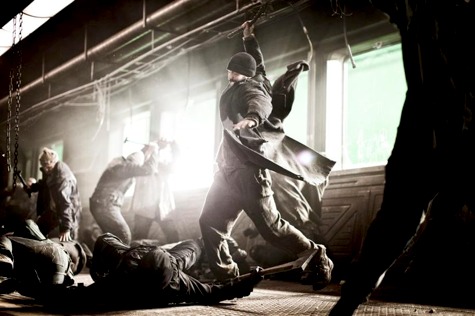
The violence is stark and brutal throughout the film, not for anyone with a weak stomach. Bong does not shy way from the reality of war and rebellion against the powerful, and it is intentionally difficult to swallow throughout. The wounded stay wounded, the blood and dirt and sweat stay put. There’s a lot of humor in the script, despite its subject matter, which offers delightful (and desperately needed) moments of respite. The laughs often originate in absurdities of contrast, and some of them are elicited due to outright nerves being built in the audience. The complete disconnect between the passengers living outside “the tail” on the train has to be funny because it’s so difficult to consider otherwise.
By the time the end is upon you, and the twists are revealing themselves like falling dominos, it is hard to catch a breath. It’s an intentional move that is natural to the pace and journey Snowpiercer accomplishes—you are being put through the same hell that the character’s experience, and reflection is a respite you will receive once it is done.
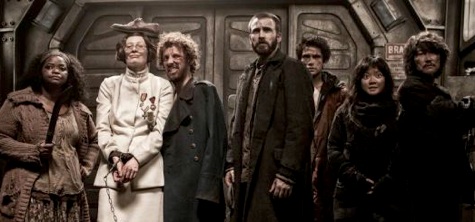
What the film is ultimately doing as its characters pass from car to car is allowing the viewer to ask the hardest of questions, with no gray area to offer places for debate. What makes humanity special enough to warrant survival? And should we really be allowed to survive when some have such abundance and others have absolutely nothing? If we do this to each other, if we support this way of life (either by design or obliviousness), do we have a worthwhile future to speak of? Would we be better off extinct?
The answers are not comfortable or particularly encouraging because this is not high-moral science fiction—it is the horror of our worst nightmares as a collective. What we gain from such a difficult narrative is a film that is never pandering, that can offer action and humor and still remind its audience to think, to remember what comes at the expense of our entertainment. Forget The Hunger Games—what we face could be so much worse than that. It arguably already is. What are you going to do about it?
Or will you simply spend your life supporting the great engine?
Emmet Asher-Perrin is still a little shaky from her viewing. You can bug her on Twitter and read more of her work here and elsewhere.










